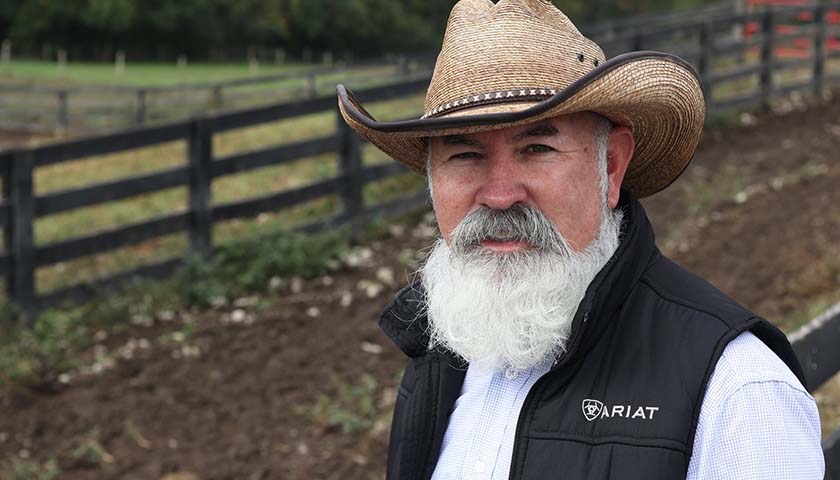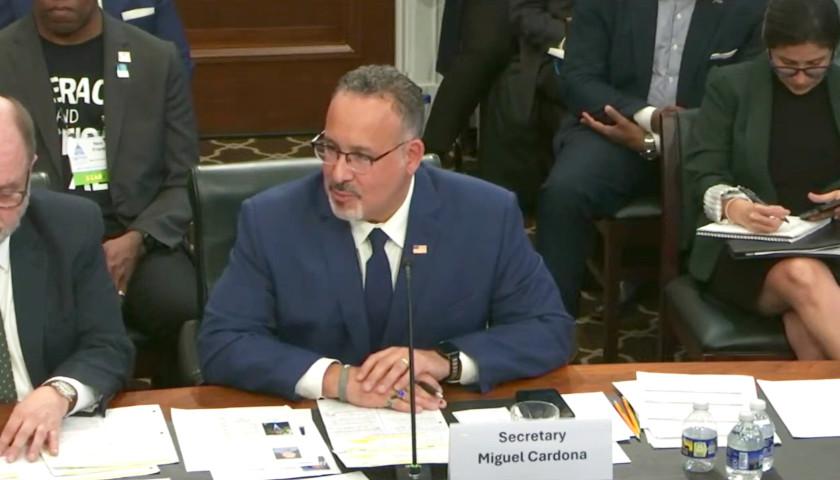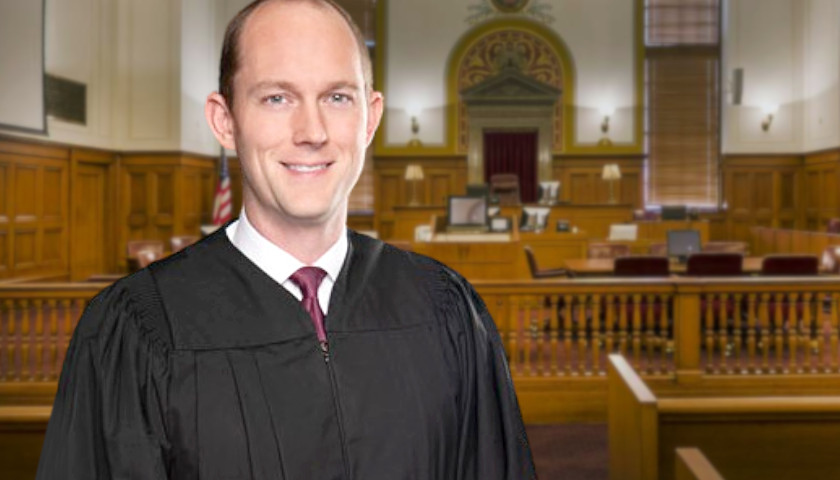The complainant of the October 28 campaign finance complaint against Republican gubernatorial candidate Joseph K. Blystone told The Ohio Star she tried to convince Blystone to play by the rules before leaving the campaign.
“I had conversations about that, I would say at least five times personal conversations about that very thing, not only myself, but other leaders who I have emails from that I still have,” said Sarah Chambers, who joined the Blystone campaign in March and for the next four months served as the co-campaign manager.
“I emailed him concerns about: ‘Hey, how are we supposed to be doing campaign finance? How do donations work? What do we need to be keeping track of?’” she said.
“After leaving the campaign, I held off on bringing this complaint forward because I was having some health issues of my own and my father was terminally ill and I was focusing on my family,” she said.
“I never joined Joe’s campaign with any thoughts of having to make a complaint like this. However, I did feel a responsibility to speak out and share the truth that I had witnessed. I did this in the interest of all constituents having the facts to make an informed decision in the upcoming election. It comes down to an election integrity issue. All candidates are held to the same campaign finance laws and all are expected to know these laws and abide by them,” she said.
Ohio election law prohibits candidates for statewide office from accepting cash contributions in excess of $100 during the course of a campaign, and specifies that all the identities of all donors making cash contributions in excess of $25 but less than $100 must be included in regular campaign finance reports.
Complaint alleges 11 counts of Blystone campaign finance corruption
The 51-page complaint with 30 exhibits, or documentations, names Blystone, his wife, and campaign committee treasurer M. Jane Blystone and “Friends of Joe Blystone,” the campaign committee.
Among the 11 counts alleged in the complaint, the first describes how Dr. Douglas G. Frank attended a May 8 Blystone event, where he donated a $100 cash donation. Yet, this donation never appeared in the Blystone campaign finance filings.
Frank told The Star that the $100 was a prop returned to him after the event.
“The video is pretty implicating,” he said.
“I gave him the $100. I told Joe I would donate $100 to him at every event I attended. Later, Joe said: ‘You’re not allowed to give me more than $100 in cash.’ He gave me the $100 back,” he said.
Frank, who gained national popularity for his research into the handling of the 2020 presidential election, said he received the $100 back a couple of weeks later at the next event. “The money, I guess, ended up being a prop.”
The researcher also told The Star that after the May 8 Blystone event, he donated $500 to Blystone online the same day in June he got back his $100. “I don’t know if my $500 has been reported.”
An Ohio Star review of Blystone campaign filing for the period ending June 30 showed no record of any donation from Frank.
Then, at Blystone’s July 4 event, Frank was videotaped again, donating $100 in cash to Blystone.
The second count highlights entries from Blystone’s campaign finance report, where he reported contributions of $258,836.00, with more than one-third of those contributions, $88,142.00, reported as cash contributions below $25.
Were this true, it would mean that the Blystone campaign received cash contributions from anywhere from 3,526 to 88,142 individuals giving at least $1.
Chambers, through the complaint, alleges that instead, Blystone was deliberately disguising the actual size and scope of his contributions, in violation of Ohio Revised Code Section 2921.41, to facilitate the theft of the funds.
“We didn’t know–none of the volunteers were instructed in campaign finance,” she said.
“It was changed sometimes through the time that I was there, so at one point, it was anything over $100 needs to be documented, but nothing else,” she said. “Then it was anything over $50, anything over $25, don’t worry about anything. I mean, there were so many different instructions given that we really didn’t know what to think was OK and not OK.”
In her complaint, Chambers demands that if Blystone is found guilty of the second count that the State of Ohio ban him from holding public office in the state.
In her third count, Chamber deals with how Blystone handled her donations to his campaign, specifically that she contributed $13,871.97 to Blystone, but he only reported that he received $515 from her.
In the ninth count, Chamber alleged that Blystone gave supporters pop-up campaign kits with 50 signs, 20 shirts and 20 stickers for $1070.
Blystone told supporters they could then resell the material in the kit for whatever price they choose, as long as the campaign got $1070 for each one, she said.
In her complaint, the former co-campaign manager alleged: “The very design of this process calls for the deliberate concealment of actual donors to the campaign.”
Chambers told The Star the pop-up kit scheme was not vetted for its legality.
“I didn’t come up with the idea; the other leaders came up with that particular idea, brought it forward to us,” she said. “We took to Joe, and we said: ‘Hey, does this work? Is this something we could do? Is this something we could make happen?’ and he said: ‘Yeah, that sounds like a great idea.’”
Supporters who took the kits had to give the campaign their payment information, she said. “A leader who would reserve one with credit cards I have on file, and if they did not either return the unused items with the donation or the cash, also the ones that they sold, they would be charged for the remainder of the kit or the entire kit.”
In her Oct. 21 affidavit, sworn under pains and penalties of perjury, which accompanied the complaint, Chambers described unreported cash contributions that went directly to Mr. and Mrs. Blystone.
“I witnessed hundreds give $50, $100 and more without any documentation being taken from volunteers,” she wrote.
“At most events, we would have a donation bucket for any cash donations to be put in,” she wrote. “At the end of the event, we would empty the cash without knowing who gave what and give the cash to Joe or Jane.”
LaRose spokesman deflects questions regarding practices described in the complaint
Chambers also called on Secretary of State Frank LaRose to probe these allegations and the others in the complaint in her affidavit. “I strongly suggest the Ohio Secretary of State launch an investigation into this activity.”
The Ohio Star reached out to LaRose for comment with voicemails on LaRose’s cellphone and texts messages.
The Star asked LaRose’s press secretary Robert Nichols about two practices featured in the Chambers complaint. Nichols said if the questions were emailed to him, he would go to one of the campaign lawyers in LaRose’s office and get the lawyer’s comments to the outlet.
These are the two questions, written so they would not apply directly to the Blystone campaign, were emailed to Nichols:
Q: Is it legal for a contributor to make a public display of donating a $100 bill into a bucket, only to have the candidate return the $100 bill to the contributor, because the $100 was not a sincere contribution, rather it was a prop? In this scenario, the $100 bill was a prop to encourage others to contribute? Are prop donations legal? Does the prop contribution have to be reported in and out?
Q: Is it legal for a candidate to “sell” a box of campaign paraphernalia, i.e., shirts, buttons, bumper stickers, and signs, for, say, $1040 if the purchaser is then told they are free to charge whatever they want for the contents of the box? In this scenario, the candidate only receives $1040–regardless of what the purchaser receives, regardless of what the box purchaser.
When The Star followed up with Nichols, he said there would be no comment from LaRose nor the office’s campaign finance attorneys.
Instead, he said there would only be a statement from him: “If anyone has a concern such as these, they should file it with the Ohio Elections Commission.”
The Star called the Ohio Elections Commission and was told campaign finance lawyer Philip C. Ritcher was working from home but would respond to emailed questions. Ritcher was emailed Nov. 11 with the same questions sent to Nichols, but there was no reply.
Chambers: I tried to convince Blystone to run a clean campaign
The former Blystone campaign volunteer said she struggled to reconcile the campaign’s goals and her moral compass regarding how the candidate handled his finances.
“It was about feeling that we needed change and that our current governor was just really trampling on our constitutional rights,” Chambers said.
“For myself and I think many others who joined the campaign, we just all were saying: ‘How can we help? What is our future?’ and ‘We need change, we can’t continue the way we are, we need to protect Ohio,’” she said. “This was a way to jump in and try to help, bring in change to Ohio and bring change for our rights.”
Chambers said she and other volunteers pleaded with Blystone to obey the state’s campaign finance laws and bring in professionals to handle the contributions.
“He wasn’t concerned at all. It was not a priority in the campaign,” she said.
“Several leaders did put forward questions about campaign finance laws. As volunteers, none holding paid positions, we did not know campaign finance laws and believed it to be the responsibility of the candidate to educate himself in these areas and then inform his volunteers,” she said.
“We were not informed of the correct way to collect donations or document these donations, she said. “Ultimately, we did as the candidate instructed in everything.”
The Westerville, Ohio, native said she was so troubled by the business practices of Blystone and his campaign that she reached out to other conservative activists, including a friend who was a senior staffer for Glenn A. Youngkin’s successful 2021 Virginia governor’s campaign.
“I was calling for advice, not just him, but many people and the overwhelming advice that I got from the time I stepped onto that campaign in March was, priorities are you need to get a campaign finance expert,” she said. “You need to have an attorney on that campaign, and you really need to have a CPA, and you need to have somebody experienced in campaign finance because it’s an important thing and it’s hard to follow.”
Again, this was a point that Chambers said she made repeatedly with the Blystone campaign. “If you want to do things right, and keep your campaign clean, then y’all need to be hiring these positions. I brought that to the attention of the campaign numerous times.”
Another red flag had Blystone’s wife as the campaign treasurer, she said.
She said that her concern about a conflict of interest or at least an appearance of impropriety was shared by other senior staffers and volunteers on the campaign.
“I have emails showing the front leaders on the complaint, emailing and saying: ‘Hey, who’s handling campaign finance? Are we doing this?’ and several leaders saying: ‘Is it a bad idea for your wife to be the treasurer?’” she said.
“That’s simply not because we didn’t trust her,” she said.
“I mean, if there was ever a question, it’s like: ‘Well, your wife’s the treasurer?’ It just doesn’t protect you.” she said.
“It was questioned by several,” she said. “Not because we thought Jane wasn’t trustworthy but because it didn’t seem wise to have a family member keep the books. It seemed that this could lead to scrutiny if anything financially ever came under scrutiny. When running a grassroots campaign against an incumbent, the best thing to do is to be wise and above reproach in hopes of eliminating any questions of integrity before they can arise.”
Hearing on the Chambers complaint December 16
Chambers’ complaint is scheduled to come before the Ohio Election Commission at the panel’s December 16 meeting.
“From my understanding, the preliminary hearing will be just when they will have the opportunity to answer the complaint,” she said.
“Those on the complaint, most of us will be there,” she said.
“Although we may not be called to testify, we may also be called to testify; that kind of depends,” she said. “It’s at the jurisdiction of the Ohio Elections Commission as to whether they call somebody that day, then from there, they will decide whether there’s not enough evidence to throw out the case, or whether they will proceed with a hearing or move forward the court over to the prosecuting attorney.”
For this complaint, the prosecutor would be Franklin County Prosecuting Attorney G. Gary Tyack.
Chambers staying on the sidelines after battling COVID-19, losing her father
“Right now, I’m just kind of staying back and just taking in, and the candidates really trying to dig deep, and listen and pay attention to how their campaigns are running and what they’re saying,” she said.
“What I would say I’ve learned from this whole situation to sit back, and watch, and pay attention, and really research a candidate before you decide to get involved in their candidacy or trying to help,” she said.
After she left the Blystone campaign in the summer, Chambers said she focused on her health and family.
“I had to have surgery shortly after I came off, and this was too stressful,” she said. “I was working 12-hour days on that campaign, and it was just too much with my health issues.”
Then, she battled COVID-19, she said.
“When I left the campaign, I didn’t want to be negative,” she said.
“So, I didn’t get into the other things that kind of gave me red flags when I was with the campaign at that time,” she said. “Shortly after I came off the campaign, I got COVID; I was in the ICU for a week. Right after that, my dad got sick, got COVID and eventually passed away.”
Chambers said her father always told her to do the right thing, and when she filed the complaint, she was doing what her father would have wanted her to do.
“In light of how our political culture is right now, I think there’s a big concern for election integrity, just all around,” she said.
“If we see something that isn’t right, a wrongdoing, and we’re serious that we want to have a fair election with integrity, then we have to call these things out.”
– – –
Neil W. McCabe is the national political editor for The Star News Network. Follow him on Twitter: @neilwmccabe2
Photo “Joe Blystone” by Blystone for Governor of Ohio.








